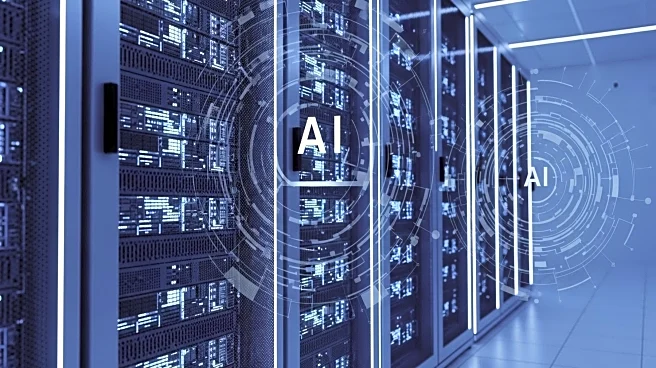What's Happening?
Several major U.S. companies are making significant investments in artificial intelligence (AI) infrastructure, focusing on both hardware and software advancements. Nvidia, Nebius, and Taiwan Semiconductor are leading the charge in AI infrastructure investment. Nvidia remains a key player with its graphics processing units (GPUs) being essential for AI workloads. Nebius is emerging as a notable player in cloud infrastructure, offering GPU rental services to enterprises. Taiwan Semiconductor Manufacturing is crucial in producing advanced semiconductors needed for AI applications. On the software side, Palantir Technologies is gaining traction with its AI software solutions, securing large contracts with entities like the U.S. Army. Additionally, Alphabet and Meta Platforms are leveraging AI to enhance their consumer and enterprise offerings.
Why It's Important?
The investments in AI infrastructure by these companies highlight the growing importance of AI in various sectors, including technology, defense, and consumer services. Nvidia's dominance in AI hardware underscores the increasing demand for powerful computing capabilities. Palantir's success in securing government contracts indicates a strong trust in its AI solutions, which could lead to further adoption in both public and private sectors. Alphabet and Meta's focus on AI-driven personalization and integration suggests a shift towards more intelligent and efficient consumer interactions. These developments could lead to significant advancements in AI technology, impacting industries such as healthcare, finance, and energy.
What's Next?
As these companies continue to invest in AI infrastructure, we can expect further innovations and applications of AI technology. The partnerships and contracts secured by companies like Palantir may lead to more strategic alliances and collaborations. The ongoing development of AI hardware and software will likely drive new business models and opportunities, potentially reshaping industries and creating new markets. Stakeholders, including investors and policymakers, will be closely monitoring these advancements to assess their impact on the economy and society.
Beyond the Headlines
The expansion of AI infrastructure raises questions about data privacy, security, and ethical considerations. As AI becomes more integrated into daily life, there will be increased scrutiny on how data is collected, used, and protected. Companies will need to address these concerns to maintain public trust and comply with regulations. Additionally, the rapid growth of AI technology may lead to workforce changes, requiring new skills and potentially displacing certain jobs. Addressing these challenges will be crucial for ensuring a balanced and equitable transition to an AI-driven economy.










